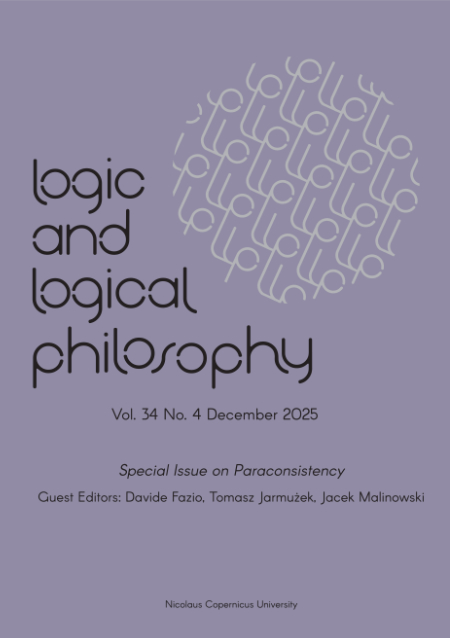Constructive Logic is Connexive and Contradictory
DOI:
https://doi.org/10.12775/LLP.2024.001Słowa kluczowe
constructive logic, connexive logic, contradictory logics, Drinker principle, Drinker truism, Brouwer-Heyting-Kolmogorov interpretationAbstrakt
It is widely accepted that there is a clear sense in which the first-order paraconsistent constructive logic with strong negation of Almukdad and Nelson, QN4, is more constructive than intuitionistic first-order logic, QInt. While QInt and QN4 both possess the disjunction property and the existence property as characteristics of constructiveness (or constructivity), QInt lacks certain features of constructiveness enjoyed by QN4, namely the constructible falsity property and the dual of the existence property.
This paper deals with the constructiveness of the contra-classical, connexive, paraconsistent, and contradictory non-trivial first-order logic QC, which is a connexive variant of QN4. It is shown that there is a sense in which QC is even more constructive than QN4. The argument focuses on a problem that is mirror-inverted to Raymond Smullyan’s drinker paradox, namely the invalidity of what will be called the drinker truism and its dual in QN4 (and QInt), and on a version of the Brouwer-Heyting-Kolmogorov interpretation of the logical operations that treats proofs and disproofs on a par. The validity of the drinker truism and its dual together with the greater constructiveness of QC in comparison to QN4 may serve as further motivation for the study of connexive logics and suggests that constructive logic is connexive and contradictory (the latter understood as being negation inconsistent).
Bibliografia
Almukdad, A., and Nelson, D., “Constructible falsity and inexact predicates”, The Journal of Symbolic Logic 49 (1984): 231–233. DOI: http://dx.doi.org/10.2307/ 2274105
Beth, E. W., Aspects of Modern Logic, Reidel, Dordrecht, 1970.
Buss, S., “An introduction to proof theory”, pages 1–78 in S. Buss (ed.), Handbook of Proof Theory, Elsevier, Amsterdam, 1998.
Casari, E., “Intermediate logics”, Atti degli incontri di Logica Matametica 1 (1982): 243–298.
van Dalen, D., Logic and Structure, 4th ed., Springer, Heidelberg, 2004
Fazio, D., A. Ledda, and P. Paoli, “Intuitionistic logic is a connexive logic”, Studia Logica (2023). DOI: http://dx.doi.org/10.1007/s11225-023-10044-7
Ferguson, T. M., “Negation in negationless intuitionistic mathematics”, Philosophia Mathematica (2022). DOI: http://dx.doi.org/10.1093/philmat/nkac026
Francez, N., A View of Connexive Logic, College Publications, London, 2021.
Girard, J.-Y., Proofs and Types, translated and with appendices by P. Taylor and Y. Lafont, Cambridge University Press, Cambridge, 1989.
Goranko, V., G. Pulcini, and T. Skura, “Refutation systems: An overview and some applications to philosophical logics”, pages 173–197 in F. Liu, H. Ono, and J. Yu (eds.), Knowledge, Proof and Dynamics. The Fourth Asian Workshop on Philosophical Logic, Springer, Cham, 2020.
Johansson, I., “Der Minimalkalkül, ein reduzierter intuitionistischer Formalismus”, Compositio Mathematica 4 (1930): 119–136.
Komori, Y., ‘Some results on the super-intuitionistic predicate logics”, Reports on Mathematical Logic 15 (1983): 13–31.
López-Escobar, E. G. K., “Refutability and elementary number theory”, Indigationes Mathematicae 34 (1972), 362–374. DOI: http://dx.doi.org/10.1016/1385-7258(72)90053-4
McCall, S., “A history of connexivity”, pages 415–449 in D. Gabbay, F. Pelletier, and J. Woods (eds.), Handbook of the History of Logic, Vol. 11, Elsevier, Amsterdam, 2012.
Nakamura, T., “Disjunction property for some intermediate predicate logics”, Reports on Mathematical Logic 15 (1983), 33–39.
Odintsov, S. P., Constructive Negations and Paraconsistency, Springer, Dordrecht, 2008.
Odintsov, S. P., and H. Wansing, “Inconsistency-tolerant description logic. Motivation and basic systems”, pages 301–335 in V. Hendricks and J. Malinowski (eds.), Trends in Logic. 50 Years of Studia Logica, Kluwer Academic Publishers, Dordrecht, 2003. DOI: http://dx.doi.org/10.1007/978-94-017-3598-8
Omori, H., and H. Wansing, “An extension of connexive logic C”, pages 503–522 in S. Negri et al., (eds.), Advances in Modal Logic, Vol. 13, College Publications, London, 2020.
Ono, H., “Some problems in intermediate predicate logics”, Reports on Mathematical Logic 21 (1987): 55–67; Supplement 22 (1988): 117–118.
Prawitz, D., Natural Deduction: A Proof-theoretical Study, Almqvist & Wiksell, Stockholm, 1965. Reprinted with Dover Publications, 2006.
Smullyan, R., What is the Name of this Book? The Riddle of Dracula and Other Logical Puzzles, Prentice-Hall, Englewood Cliffs, 1978.
Troelstra, A., and D. van Dalen, Constructivism in Mathematics. An Introduction, Elsevier, Amsterdam, 1988.
Vredenduin, P. G. J., “The logic of negationless mathematics”, Compositio Mathematica 11 (1953): 204–270.
von Kutschera, F., “Ein verallgemeinerter Widerlegungsbegriff für Gentzenkalküle”, Archiv für mathematische Logik und Grundlagenforschung 12 (1969): 104–118. DOI: http://dx.doi.org/10.1007/BF01969697
Wansing, H., The Logic of Information Structures, Springer Lecture Notes in AI 681, Springer, Berlin, 1993.
Wansing, H., “Negation”, pages 415–436 in L. Goble (ed.), The Blackwell Guide to Philosophical Logic, Basil Blackwell Publishers, Cambridge/MA, 2001.
Wansing, H., “Connexive modal logic”, pages 367–383 in R. Schmidt et al. (eds.), Advances in Modal Logic, Vol. 5, King’s College Publications, London, 2005. http://www.aiml.net/volumes/volume5/
Wansing, H., “One heresy and one orthodoxy: On dialetheism, dimathematism, and the non-normativity of logic”, Erkenntnis (2022). DOI: http://dx.doi.org/10. 1007/s10670-022-00528-8
Wansing, H., ”Connexive logic”, The Stanford Encyclopedia of Philosophy (Summer 2023 Edition), E. N. Zalta and U. Nodelman (eds.). https://plato.stanford.edu/archives/sum2023/entries/logic-connexive/
Wansing, H., “A note on synonymy in proof-theoretic semantics”, to appear in T. Piecha and K. Wehmeier (eds.), Peter Schroeder-Heister on Proof-theoretic Semantics, Springer, Cham, 2024.
Wansing, H., and S. Ayhan, “Logical mutilateralism”, Journal of Philosophical Logic, 52 (2023): 1603–1636. DOI: http://dx.doi.org/10.1007/s10992-023-09720-9
Warren, L., H. Diener, and M. McKubre-Jordens, “The Drinker paradox and its dual”, 2018. DOI: http://dx.doi.org/10.48550/arXiv.1805.06216
Pobrania
Opublikowane
Jak cytować
Numer
Dział
Licencja
Prawa autorskie (c) 2024 Heinrich Wansing

Utwór dostępny jest na licencji Creative Commons Uznanie autorstwa – Bez utworów zależnych 4.0 Międzynarodowe.
Statystyki
Liczba wyświetleń i pobrań: 2604
Liczba cytowań: 0







